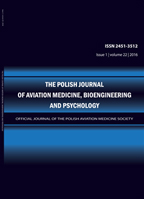2016, Volume 22, Issue 4
THE USE OF HYDROGELS TO IMPROVE THE PSYCHOPHYSIOLOGICAL AND PSYCHOMOTOR CONDITION OF MILITARY PERSONNEL CARRYING OUT TASKS UNDER THE CONDITIONS OF HEAT
Anna CZERWIŃSKA1, Anna PRZEWODZKA1
-------------------------------------------------------------------------------------------------
1Military Institute of Aviation Medicine
Autor korenspondencyjny: Anna CZERWIŃSKA; Military Institute of Aviation Medicine; email: a.czerwinska@wiml.waw.pl
Full text
Streszczenie
Introduction: The aim of the study was to evaluate the eff ect of cooling hydrogel on psychophysiological condition, psychomotor effi ciency of the organism and subjective thermal sensations and workload in hot conditions.
Methods: The experimental group consisted of 26 healthy men not acclimated to high temperature. The unit test was conducted under simulated high temperature conditions (thermal chamber): Ta=35±1°C, RH=30±1%, t=105min) in the environment of which the respondents alternately passed through rest and exercise cycles (1.5W/kg). In 40min of exposure to the combined heat load conditions (exo and endogenous load conditions) examined in the neck and sternum area, a hydrogel fi lled with active cooling agent was assumed - 0.35% of menthol lactate. During the experiment, objective physiological indicators were recorded: HR, Tc, Tsk (neck and sternum area) and subjective sensations: assessment of the severity of physical workload (Borg test), state of thermal comfort for the whole body and assessment of thermal sensations in relation to the cooled area of the neck and sternum (Bedford test). Psychomotor effi ciency and concentration of attention were assessed on the basis of: the adjective scale of mood UMACL, RW test, the visual-motor tester.
Results: In patients using hydrogel favourable physiological changes of physiological parameters were observed, which indicated a reduction of heat load (lower Tsk values in both the neck and sternum area) and reduction of cardiovascular load (heart rate at a relatively constant level). As a result of hydrogel’s action, the subjective assessment of thermal comfort, thermal sensations and annoyance of physical work was also improved, as well as in terms of concentration of attention, visual-motor coordination and emotional state of the examined persons.
Conclusions: The applied hydrogel fi lled with 0.35% of menthol lactate eff ectively improves psychophysiological and psychomotor state of the organism in a state of positive heat load and positively infl uences the deterioration of subjective thermal sensations.
Słowa kluczowe
selective body cooling, hydrogel, thermal comfort, thermal sensations
